#blame “Strangers” by Kenya Grace for this one
Text
day 20
She could feel an odd quaking at the edges of her vision, foreign and unusual, and it wasn't until the first drop rolled down her cheek that Camilla realized she was shaking.
A gentle hand reached toward her cheek, and she shook harder. "Darling, what's this?"
"Don't call me that," she said, and the words tumbled out far more roughly than she'd intended.
The hand withdrew slowly, and if she kept focusing on extremities, appendages, limbs, maybe she wouldn't have to think about who they were attached to. But she knew that hand too well, knew it across years and iterations, knew it small and unmarked and long and agile and deft and worn by lab work – and he filled her field of vision in a rush, impossible to hold at bay, architect of her dams.
She hated it with a vicious abruptness that had been waiting in the wings for years. She hated that she knew that he would once have rushed to wipe her tears.
Once, she would have let him.
"She's changed you," she said, souring on the words as soon as they left her mouth. She loved her, too, in a way, and maybe if she were a more generous person, more boundlessly giving, that would be enough to counterbalance the ways in which she found her relegation to the wings increasingly grating. Maybe, in another world, one where nothing mattered but his ends, and her flesh was his to use and she would set herself aflame given the slightest provocation, she would be able to keep the home fires burning on his motivations alone.
How outrageously cliché. Get healthier, grow boundaries, get thrown over.
"People don't change people. Time does," he said, and the fatigue in his voice was a better propellant for her than anything they'd passed between the two of them in the past hour.
Dizzy, beyond reason, she launched herself to her feet.
"Cam?"
"Then I need time," she said. She whirled around, unseeing.
"Camilla, darling–"
"Don't call me that," she gritted, and she ran.
With each hit of sole to pavement, with each additional meter between her and that park bench, the knot in her chest lurched, and grew, and she knew it was going to burn her more before it got better.
#blame “Strangers” by Kenya Grace for this one#and symmetry with day 19 - team 69's cavs no longer taking emotional torment in a modern AU#whumptober2023#no.20#lyric#“people don't change people time does”#the locked tomb#fanfic#fanfiction#tlt fanfic#tlt fanfiction#the locked tomb fanfiction#lira does a thing#camilla hect#palamedes sextus#campal#raise your hand if you've been personally victimized by palamedes sextus#i am sad and so is camilla hect#dulcie haunts the narrative#these codependent motherfuckers
2 notes
·
View notes
Text
BLOGTOBER 10/7/2020
I missed THE GOLDEN GLOVE at Fantastic Fest last year. It was one of my only regrets of the whole experience, but it was basically mandatory since the available screenings were opposite the much-hyped PARASITE. As annoying as that sounds, it was actually a major compliment, since what could possibly serve as a consolation prize for the most hotly anticipated movie of the year? Needless to say, I heard great things, but I could never have imagined what it was actually like. I'm still wrapping my mind around it.
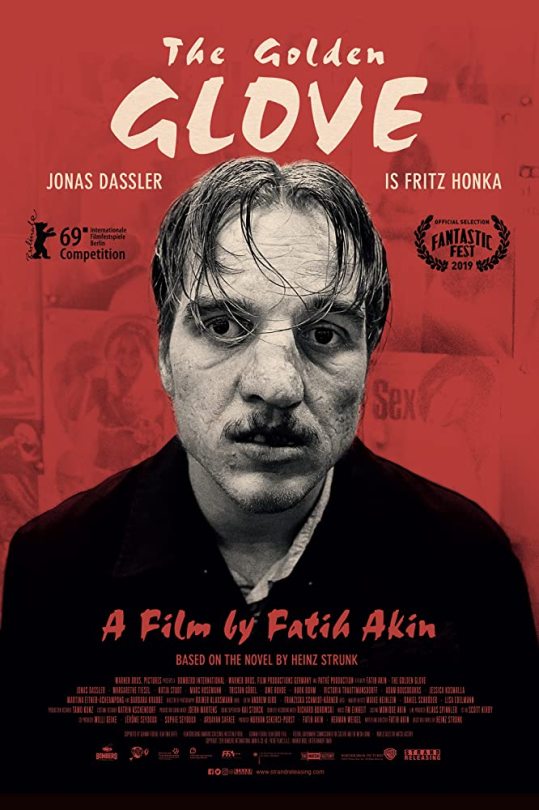
Between 1970 and 1975, an exceptionally depraved serial killer named Fritz Honka murdered at least four prostitutes in Hamburg's red light district. Today, we tend to think of the archetypal serial killer in terms of ironic contradictions: The public is attracted by Ted Bundy's dashing looks and suave manner, and John Wayne Gayce's dual careers as politician and party clown. Lacking anything so remarkable, we associate psychopathy with Norman Bates' boy-next-door charm, and repeat "It's always the quiet ones" with a smirk whenever a new Jeffrey Dahmer or Dennis Nilsen is exposed to the public. The popular conception of a bloodthirsty maniac is not the fairytale monster of yore, but a wolf in sheep's clothing, whose hygienic appearance and lifestyle belie his twisted desires. In our post-everything world, the ironic surprise has become the rule. In this light, THE GOLDEN GLOVE represents a refreshing return to naked truth.
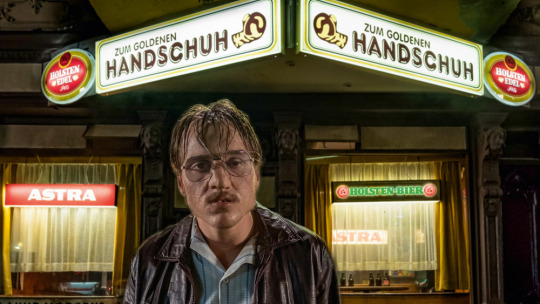
To say that writer-director Fatih Akin's version of the Fritz Honka story is shocking, repulsive, and utterly degenerated would be a gross understatement. We first meet the killer frantically trying to dispose of a corpse in his filthy flat, wallpapered with porno pinups, strewn with broken toys, and virtually projecting smell lines off of the screen. One's sense of embodiment is oppressive, even claustrophobic, as the petite Honka tries and fails to collapse the full dead weight of a human corpse into a garbage bag, before giving up and dismembering it, with nearly equal difficulty. The scene is appalling, utterly debased, and yet nothing is as shocking as the killer's visage. When he finally turns to look into the camera, it's hard to believe he's even human: the rolling glass eye, the smashed and inflated nose, the tombstone teeth and cratered skin, are almost too extreme to bear. Actually, suffering from a touch of facial blindness, I had to stare intently at Honka's face for nearly half the movie before I could fully convince myself that I was, in fact, looking at an elaborate prosthetic operation used to transform 23 year old boy band candidate Jonas Dassler into the disfigured 35 year old serial murderer.

Though West Germany remained on a steady economic upturn beginning in the 1950s and throughout the 1970s, you wouldn't know it from THE GOLDEN GLOVE. If Honka's outsides match his insides, they are further matched by his stomping grounds in the Reeperbahn, a dirty, violent, booze-soaked repository for the dregs of humanity. Though its denizens may come from different walks of life, one thing is certain: Whoever winds up there, belongs there. Honka was the child of a communist and grew up in a concentration camp, yet he swills vodka side by side with an ex-SS officer, among other societal rejects, in a crumbling dive called The Golden Glove. The scene is an excellent source of hopeless prostitutes at the end of their career, who are Honka's prime victims, as he is too frightful-looking to ensnare an attractive young girl. These pitiful women all display a peculiarly hypnotic willingness to go along with Honka, no matter how sadistic he becomes; this seems to have less to do with money, which rarely comes up, and more to do with their shared awareness that for them, and for Honka too, it's been all over, for a long time.

Not to reduce someone’s performance to their physical appearance, but ???
To call Dassler's portrayal of Honka "sympathetic" would be a bridge too far, but it is undeniably compelling. He supports the startling impact of his facial prostheses with a performance of rare intensity, a full-body transformation into a person in so much pain that a normal life will never become an option. His physical vocabulary reminded me of the stage version of The Elephant Man, in which the lead actor wears no makeup, but conveys John Merrick's deformities using his body alone. Although there is an abundance of makeup in THE GOLDEN GLOVE, Dassler's silhouette and agonized movements would be recognizable from a mile away. In spite of his near-constant screaming rage, the actor manages to craft a rich and convincing persona. During a chapter in which Honka experiments with sobriety, we find a stunning image of him hunched in the corner of his ordinarily chaotic flat, now deathly still, his eyes gazing at nothing as cigarette smoke seeps from his pores, having no idea what to do with himself when he isn't in a rolling alcoholic rampage. The moment is brief but haunting in its contrast to the rest of the film, having everything to do with Dassler's quietly vibrating anxiety.
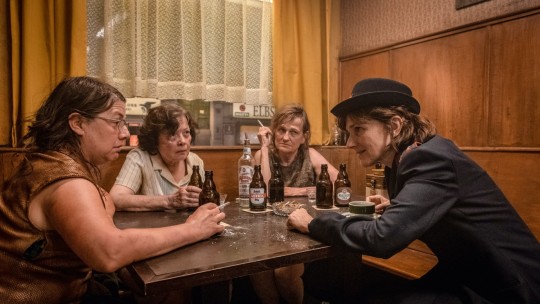
Performances are roundly excellent here, not that least of which are from Honka's victims. The cast of middle-aged actresses looking their most disastrous is hugely responsible for the film's impact. These are the kinds of performances people call "brave", which is a euphemism for making audiences uncomfortable with an uncompromising presentation of one's own self, unvarnished by any masturbatory solicitation. Among these women is Margarete Tiesel, herself no stranger to difficult cinema: She was the star of 2012's PARADISE: LOVE, a harrowing drama about a woman who copes with her midlife crisis by pursuing sex tourism in Kenya. Her brilliant, instinctive performance as one of Honka's only survivors--though she nearly meets a fate worse than death--makes her the leading lady of a movie that was never meant to have one.

So, what does all this unpleasantness add up to, you might be asking? It's hard to say. THE GOLDEN GLOVE is a film of enormous power, but it can be difficult to explain what the point of it is, in a world where most people feel that the purpose of art is to produce some form of pleasure. This is the challenge faced by difficult movies throughout history, like THE GOLDEN GLOVE's obvious ancestors, HENRY: PORTRAIT OF A SERIAL KILLER, MANIAC and THE TEXAS CHAIN SAW MASSACRE. Describing unremitting cruelty with relentless realism is not considered a worthy endeavor by many, even if there is real artistry in your execution; some people will even mistake you for advocating and enjoying violence and despair, as we live in a world where huge amount of movie and TV production is devoted to aspirational subjects. (The fact that people won't turn away from the Marvel Cinematic Universe movies, no matter how monotonous and condescending they become, should tell you something) How do you justify to such people, that you want to make or see work that portrays ugliness and evil with as much commitment as other movies seek to portray love, beauty, and family values? Why isn't it enough to say that these things exist, and their existence alone makes them worth contemplation?

A rare, perhaps exclusive “beautiful image” in THE GOLDEN GLOVE, from Fritz Honka’s absurd fantasies.
You may detect that I have attempted to have this frustrating conversation with many people, strangers, enemies, and friends I love and respect. I find that for some, it is simply too hard to divorce themselves from the pleasure principle. I don't say this to demean them; some hold the philosophy that art be reserved for beauty, and others have a more literary feeling that it's ok to show characters in grim circumstances, as long as the ultimate goal is to uplift the human spirit. Even I draw the line somewhere; I appreciate the punk rebellion of Troma movies as a cultural force, but I do not enjoy watching them, because I dislike what I perceive as contempt for the audience and the aestheticization of laziness--making something shitty more or less on purpose. A step or three up from that, you land in Todd Solondz territory, where you find materially gorgeous movies whose explicit statement is that our collective reverence for a quality called "humanity" is based on nothing. I like some of those movies, and sometimes I even like them when I don't like them, because I'm entranced by Solondz's technical proficiency...and maybe, deep down, I'm not completely convinced about "humanity", either. However, I don't fight very hard in arguments about him; I understand the objections. Still, I've been surprised by peers who I think of as bright and tasteful, who absolutely hated movies I thought were unassailable, like OLDBOY and WE NEED TO TALK ABOUT KEVIN. In both cases, the ultimate objection was that they accuse humans of being pretentious and self-deceptive, aspiring to heroism or bemoaning their victimhood while wallowing in their own cowardice and perversity. Ok, I get it...but, not really. Why isn't it ever wholly acceptable to discuss, honestly, what we do not like about ourselves?
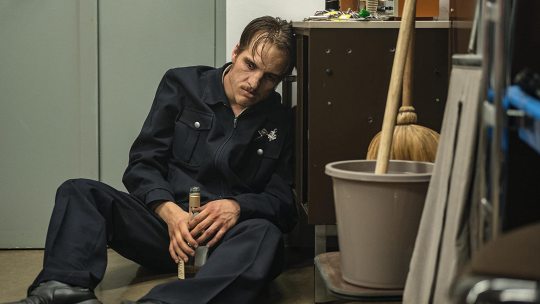
The beguiling thing about THE GOLDEN GLOVE is that, although it is instantly horrifying, is it also an impeccable production. The director can't help showing you crime scene photos during the ending credits, and I can't really blame him, when his crew worked so hard to bring us a vision of Fritz Honka's world that approaches virtual reality. But it isn't just slavishly realistic; it is vivid, immersive, an experience of total sensory overload. Not a square inch of this movie has been left to chance, and the product of all this graceful control is totally spellbinding. I started to think to myself that, when you've achieved this level of artifice, what really differentiates a movie like THE GOLDEN GLOVE from something like THE RED SHOES? I mean, aside from their obvious narrative differences. Both films plunge the viewer into a world that is complete beyond imagination, crafted with a rigor and sincerity that is rarely paralleled. And, I will dare to say, both films penetrate to the depths of the human soul. What Fatih Akin finds there is not the same as what Powell and Pressburger found, of course, but I don't think that makes it any less real. Akin's film is adapted from a novel by Heinz Strunk, and apparently, some critics have accused Akin of leaving behind the depth and nuance of the book, to focus instead on all that is gruesome about it. This may be true, on some level; I wouldn't know. For now, I can only insist that on watching THE GOLDEN GLOVE, for all its grotesquerie, I still got the message.
#blogtober#2020#the golden glove#fatih akın#heinz stronk#jonas dassler#margarete tiesel#difficult cinema#horror#slasher#serial killer#period piece#adaptation#historical#biopic#fritz honka#i may have been watching a lot of powell and pressburger movies recently#sorry...
23 notes
·
View notes
Text
Letting go of shame
“You don’t have to apologize for who you are, Shane. You don’t have to make any validations or explain anything. God made you who you are, strengths and weaknesses, and gave you your wife and those beautiful children because he trusts you with them—isn’t that beautiful? Not everyone is going to understand that, but they don’t have to. This is your journey.”
And goddammit if she wasn’t right. Her name was Sara, and I met her Wednesday night at a bible study. It was an LGBT study and a friend, Amy, invited me. I decided to go because I have so far been in circles where people know and accept my identity, or people who know and accept my faith. I can’t recall having both equally accepted in one place.
I was fighting back tears as she talked because I didn’t want to let it in. The truth of her words almost made me angry, though I don’t know why. Maybe I’m angry because for years and years and years I have felt like I’m supposed to feel bad for where I’m at. Something went wrong, right? I’m a Christ follower, I’m same-sex attracted and no longer believe that’s something that will change *gasp*. Or that is even supposed to change. I mean, is it okay to say that? I guess I’m still struggling with the weight of accepting such a massive notion—that God loves me exactly as I am today. That I don’t have to change a thing about who I am in order for him to love me. My history with the church tells me otherwise.
Maybe that’s where the anger comes from. That I feel robbed of the years of freedom I could have experienced if I had accepted that God loved me just as I was. That I didn’t have to—that I don’t have to—do anything different for God to love me any more than he does right now. Are. You. Fucking. Kidding. Me???
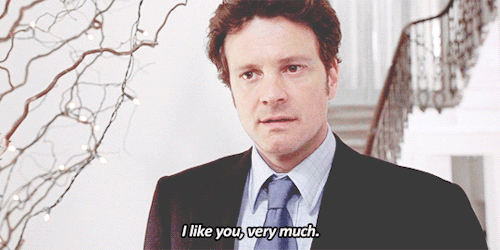
[please, dear God, tell me you remember this scene? I’m also hoping the occasional gif will lighten the weight of such a heavy post]
Even as I’m writing these words, I'm honestly having such a hard time taking that in. I want to weep or punch a hole in the wall. For years, I have squirmed around under the weight of shame that I should feel bad for just existing. If I was a better Christian, I wouldn’t be this way. Right? If I was closer to God, I would have turned out... straight? Or, given that I now have a wife, if I loved her enough, then my attraction would only be devoted to her and the gay feelings would just disappear. Isn’t that what some of us in the church grew up to believe as true?
I have had many gay friends imply (or outright tell me), that I was just gay and that they believed my marriage to Helen was a cover that I needed to feel good about having a family and being Christian. When I got married almost 9 years, a long-time gay friend of mine, Clarence, sent me an email explaining how I was making a grave mistake. That I was in denial and doing what I thought the church and society expected of me. I guess, from his perspective, he could never understand why I wanted (and so thankful I now have) a wife and kids being that he was 100% gay. Well, maybe 110%.
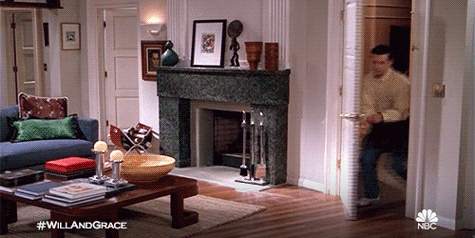
Ironically, when I decided to get married, I had a good friend turn his back on me because he didn’t agree with my life choice. Hashtag fucking ironic. Honestly though, I can’t blame him. He was trying to do his best to speak from his heart and share what he believed to be true and helpful from his worldview. I think he (and maybe others) assumed I conjured up some extrinsic attraction to Helen or made a convenient or contrived decision instead of one based on mutual love and attraction, which was actually the case. From my experience, a lot of gay guys are cool with bisexuality unless it swings in a woman’s direction.
Helen has a few guys she works with that are gay and one time when we were all together for a Friendsgiving dinner, she told me that she felt like one of them was looking at her like does this bitch know her husband is gay? We had a good laugh about it when she told me the next day. She said she wanted to just say yeah dude, I know. Simmer.
Sometimes when I’m out with my family, I’ll see a guy look at me and in an instant I can tell they’re making assumptions about my situation. Wife. Kids. Clearly Not Straight. It used to bother me and I wanted to blurt out I’m not living a lie! Jesus, stop with the judgment already. Which would undoubtedly be awkward. Maybe they were judging my situation, or maybe I had a two-foot patch of toilet paper coming out the back of my shorts. It’s hard to say. But not only did it bother me, it made me feel like I wasn’t accepted. Like these people—gay friends and strangers— were telling me that I made the wrong choice for the wrong reason and I didn’t belong.
On the flip side, when I’ve spent any length of time around straight dudes, there is misunderstanding and lack of acceptance in a different direction. If I don’t talk about sexuality with them or if they don’t know this part of my life, there’s still this kind of vibe that I don’t quite fit in. I may be able to connect with and talk about shared interests like CrossFit, cars, or a mutual hatred for the president. But it starts to unravel if I mention that I’ve never watched a full sports game start to finish, or if I can’t participate in discussions about how hot some particular girl is.

Or—God forbid—I openly talk about sexual identity and that I’m on a spectrum. I used to want so badly to be accepted by straight guy groups (men’s small groups, CrossFit buds, coworkers, etc.) but I’ve learned that you can’t force acceptance. You can only receive relationship on the terms the other person is willing to offer them. Anything beyond that turns you batshit crazy.
Here’s the thing, when people don’t know you, they don’t understand the complexity of your situation. They don’t know the depth of your thought or the reasons you made the choices you did in life. And unless they get to know you, they never will.
Most people don’t know that, a week before I met my wife in Kenya, I prayed and told God that I wanted a wife. I had increasing attraction to women into my 20s and wondered if I could find a woman who wasn’t concerned with how I identify. They don’t know that the day we met we talked about me dating men and women and she said well, one day maybe you’ll meet someone who doesn’t care who you’re attracted to, but only that you care for and are committed to them. These are things that only close friends know, if at all. And—well—now you. You’re welcome.
I guess what I’m trying to say is your journey is your journey. If people don’t know you and don’t care to get to know you, there’s no reason why their arbitrary opinion about your life or circumstances should mean anything to you. The people who love you with fierceness, intention, and grace—those are the people you should let it and listen to. Most likely they are the ones who understand the complexity of your life and who will be with you till the sun turns black.
0 notes